
Learning from crisis: building resilient systems to combat future pandemics
This annual International Health Lecture is organised by the Academy of Medical Sciences and the Lancet. It is a platform for leaders in global health to discuss topics of international significance, promoting debate, discussion and the exchange of ideas on current research. It attracts a diverse international audience. The 2020 lecture took place on 2 November and can be accessed online; it is just under two hours long. There was an excellent introduction by Professor Richard Horton, Executive Editor of the Lancet, and three main speakers:
Professor Gabriel Lueng, University of Hong Kong, who reviews the lessons learned so far in public health and discusses evidence on two controversial interventions: the use of face masks and school closures. He argues that: “There are clear gaps in the evidence on modes of transmission, and on masks as an intervention in mitigation. Nevertheless, given that there is very little possibility of harm from wearing a face mask, public guidance should be strongly recommending the practice in all settings.”
Professor Robin Shattock, Imperial College London, UK, explains how Covid-19 and the vaccine race has ‘driven an explosion of effort’, with 100 vaccines in early development and nearly 50 in clinical trials. He says: “One of the greatest and often unlauded successes was the rapid online sharing of the virus’s genome….While the development of prototype vaccines has moved at unprecedented speed, the major rate-limiting step remains the demonstration of efficacy and safety in large clinical trials.” He also comments that technology readiness, speed of production, access to scale-up capacity, affordability, and governmental support are all factors: “The latter is highly influenced by undertones of vaccine nationalism and prestige.” “The make and break for this new dynamic lies with the Covax facility – the new global risk-sharing mechanism for pooled procurement and equitable distribution of eventual COVID-19 vaccine; the ambitious goal is to distribute two billion doses of COVID-19 vaccines before the end of 2021.”
Professor Ilona Kickbusch, Global Health Centre, Graduate Institute of International and Development Studies in Geneva, Switzerland, contextualises the pandemic in the political determinants of health. She says: “We must learn to see that the greatest risk lies not with the virus but vaccine nationalism and the unwillingness to cooperate.” She believes that equitable and fair access to a Covid-19 vaccine will be the ultimate test case for society’s ability to come together to tackle the pandemic. “Right now, there is some ground for optimism: a new dynamic in relation to common goods and collective action is emerging.” She also says: “There are two lessons we need to take from the pandemic. The first is to recognise that it cannot be seen in isolation, it is but one component of a larger pattern of risk.” In the interface of politics and science, this pattern also encompasses ecological, financial and social risks, among others. “The second lesson is to understand the unambiguous relationship between risk and power: who defines the risks, who takes the political decisions and who suffers the consequences.” She points out that the spread and the impact of the pandemic in ‘populist and divisive societies’ has been defined by high death rates, high inequalities and a disregard of scientific evidence.” She concludes that we need to be “responsible for one another and for the planet on which we live.”
The use of visuals was particularly striking in these presentations. Prof Shattock showed the following set of photos from some of the poorest rural settings to illustrate the difficulties of trying to distribute two billion doses per year of a Covid-19 vaccine:

The map below, also from Prof Shattock’s presentation, visualises how international production and distribution of vaccines and other medicines could be changed, spread out across a network covering all continents and regions, rather than centralised in a few locations that requires long-distance distribution, the limitations of which have been highly visible during the Covid-19 pandemic.

Some of the science is complicated in these presentations but the extent of information about Covid-19 is unparalled and is accessible for anyone with some scientific understanding. The way the speakers all bring together policy and scientific perspectives with the social determinants of health, is amazing. Overall, you come away with an awareness of why Covid-19 became a pandemic and the reasons why the spread of the virus has been successful, specifically, the failure of public health education and the failure of national governmental health policy, even in the most developed countries, and the failure to learn from countries that have successfully contained the virus internationally.



